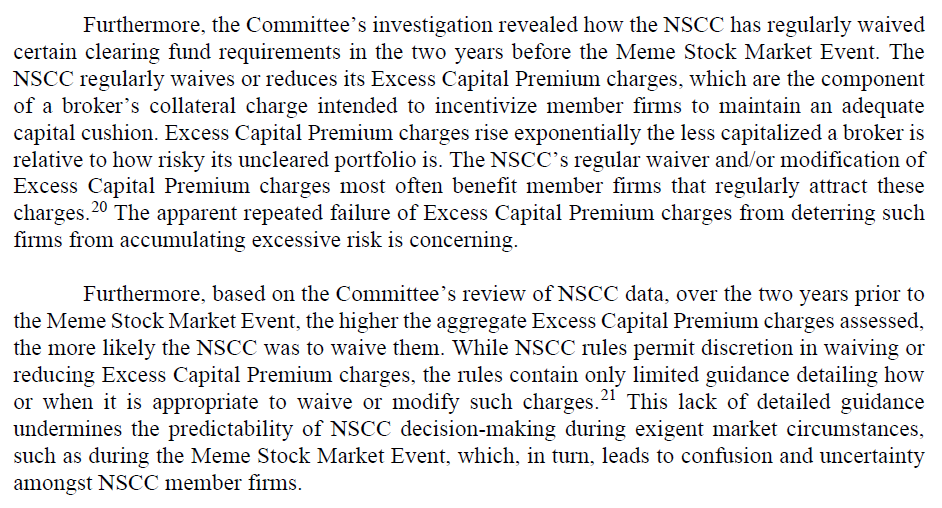
The House Financial Services Committee released a 183 page report on what the events of early 2021 exposed in terms of market weaknesses, conflicted business models, and the various problems exposed by retail interest. I haven't read it yet, but will send out thoughts when I do.
https://twitter.com/RepMaxineWaters/status/1540318859915313155
Wow - moving those names to PCO was extremely effective in generating sell pressure and reducing collateral requirements. 

As #WeTheInvestors have explained to the SEC and Congress, gamification is not the real issue here. The issue is a completely broken business model that puts brokers' interests at odds with their customers'. 



RH "did not incorporate best practices observations from FINRA for improving its stress tests nor did it utilize publicly available guidance from the DTCC for calculating collateral obligations."
Why is RH still allowed to operate? Constant fines and corrupt biz practices.
Why is RH still allowed to operate? Constant fines and corrupt biz practices.

I honestly find this key finding to be very damning. Why was the DTCC doing this? What if they had been wrong? Why could they made ad hoc decisions like this? What systemic risk did they introduce by doing this? Undercapitalized firms put entire system at risk, why bail one out? 

Again in the report we read about how the NSCC regularly waives capital charges. This could be due to a flawed margin calculator that overprices volatility, but if that's the case then why isn't it being fixed? Instead these ad hoc interventions introduce systemic risk. 

I feel like I'm going to keep screaming about this - undercapitalized brokers (ESPECIALLY ones offering free trading) represent a huge systemic risk to markets. Willful ignorance (or just straight up ignorance) should be enough for FINRA to revoke their B/D licenses. 

This paragraph really downplays the level of dependence and concentration in markets. Citadel bragged that they were the only firm left executing trades during the big run - that's a massive risk to markets, and not something to be proud of. We shouldn't be dependent on one firm. 

Overall this is a great thread summarizing the entire report. I'm just going to go through and give my reactions, not try to summarize it as well as here:
https://twitter.com/Ryan__Rigg/status/1540325270439206912
Standard response from Congress - go study the problem! Also looks like Congress wants more trading halts.
That said, @jschwall1 will be thrilled at this recommendation that internalizers be subjected to Reg SCI. It's about damn time.

That said, @jschwall1 will be thrilled at this recommendation that internalizers be subjected to Reg SCI. It's about damn time.


@jschwall1 I like the first two recommendations getting the SEC more involved in liquidity rules and management. But the rest of these depends on conflicted SROs that have already proven incapable of policing the firms who pay them. This SRO model is completely broken, it's time to overhaul 

@jschwall1 I mean this in all constructive seriousness - WHAT THE ACTUAL FUCK @FINRA? This is how we are policing brokers? Oral observations with no evidence, follow-up or repercussions? I can't believe this isn't a joke.
(this tweet might get me kicked off the committee I volunteer on)
(this tweet might get me kicked off the committee I volunteer on)

Well that's a completely surprising result of an ORAL OBSERVATION, I could never have seen that happening. 

OK - coming back to this report, will be posting some more thoughts throughout the day when I have time. FINRA's oral "advice" to RH would have left them in far better shape to manage through the volatility, and highlights a rule deficiency for liquidity planning. 

This overall explanation is in-line with my conversations with industry experts - the NSCC margin calculator combined with RH's lack of sufficient capitalization (and that of other brokers - including many Apex customers, as we'll read later) resulted in the PCO restriction. 

These internal conversations about whether RH could handle their scale are something else. Maybe infrastructure investments are a good idea when your entire business model is getting clients to trade as much as possible. 





Something we don't talk about much is how RH's PFOF model is DOUBLY corrupt. By calculating PFOF based on spread, they are not just incentivized to get their clients to trade more - they also want them trading higher spread, less liquid names. It's a disgusting business model. 





The entire section on RH strong-arming Wolverine and threatening other middlemen is eye opening. Pushing these firms to ignore their own risk constraints or lose the most lucrative business is not how you want markets to run. RH has too much power. 



Neat how the NSCC recognized the potential for systemic risk, and decided to waive many liquidity charges. Just shows you that TBTF is alive and well - get big fast, and be confident that the rules won't apply to you. 



• • •
Missing some Tweet in this thread? You can try to
force a refresh





